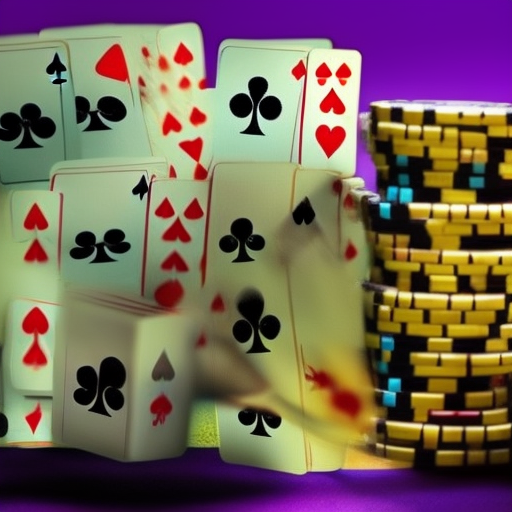Are you someone who loves a good game of poker, but have lately been facing the debate that poker only relies on luck? Is it possible to beat the game of poker without the intervention of good luck? In this article, we dive into the fascinating subject of whether poker is 100% luck and look at the evidence from both sides of the debate.
Understanding the Role of Luck in Poker
Luck is an integral part of poker, but it is not the only factor that determines success. While a lucky draw can certainly give you an edge in the short term, the game is ultimately decided by a combination of skill, strategy, and luck. For example, let’s say you’re playing Texas Hold’em, and you’re dealt a pair of aces – a lucky break indeed! However, if you don’t know how to play them correctly or manage your chips effectively, you could still lose the game.
Moreover, even the best poker players have faced unlucky runs that cost them big time. Whether it’s getting constantly beaten by improbable hands or facing a steady stream of bad cards, these seasoned pros understand that luck can be fickle. Nevertheless, they don’t let these unlucky streaks throw them off their game, but instead, they deal with it with patience and perseverance. By , players can manage their expectations and adopt a more constructive attitude towards both wins and losses.
Analyzing the Impact of Skill in Poker
It’s easy to dismiss poker as a purely luck-based game. But if you look closer, you’ll see that there’s a lot of skill involved too. Here’s why is crucial:
– Reading your opponents: One of the most important skills in poker is the ability to read your opponents. That means learning to pick up on their body language, facial expressions, and verbal cues. With enough practice, you can start to identify when someone is bluffing or holding a strong hand. And that can give you a big advantage at the table.
– Calculating odds: Another key skill in poker is the ability to calculate odds. That means being able to figure out the likelihood of certain cards coming up, and adjusting your strategy accordingly. For example, if you have a flush draw on the flop, you need to know how many cards are left in the deck that can complete your flush. And if the odds are in your favor, you might decide to stay in the hand and see if you can catch that lucky card on the turn or river.
All in all, while poker may involve some luck, it’s highly unlikely that a player will consistently win without having sufficient skill.
Evolution of the Poker Game
The
Poker has come a long way since it was first played in the early 1800s. It originated in the United States, and was initially played with just 20 cards. Over time, the game evolved to include 52 cards and multiple variations, including Texas Hold’em, Omaha, and Seven Card Stud. The popularity of poker skyrocketed in the 21st century, thanks in large part to the advent of online poker rooms and televised tournaments like the World Series of Poker. Today, the game is enjoyed by millions of people around the world, with a thriving community of professional players and enthusiasts alike.
The strategy of poker has also evolved over the years. In the early days, the game was more about bluffing and reading your opponents’ tells than actual skill. With the advent of statistical analysis and computer modeling, players can now use complex algorithms to determine the best move in any given situation. However, at its core, poker is still a game of human interaction – of reading your opponents, understanding their tendencies, and making the best decision based on that information. No matter how much technology advances, nothing can replace the thrill of outsmarting an opponent in a game of poker.
Key takeaways:
- Poker has evolved over time to include 52 cards and multiple variations including Texas Hold’em, Omaha, and Seven Card Stud.
- The popularity of poker skyrocketed in the 21st century thanks to the advent of online poker rooms and televised tournaments like the World Series of Poker.
- Poker strategy has evolved with the advent of statistical analysis and computer modeling, but the game remains a game of human interaction and outsmarting your opponent.
Conclusion
So, is poker 100% luck? The short answer is no. While luck does play a role in individual hands and outcomes, the most successful poker players rely heavily on skill, strategy, and reading their opponents.
Take the example of Daniel Negreanu, one of the most successful poker players in history. He has won six World Series of Poker bracelets and over $42 million in tournament earnings. While luck may have played a role in some of his victories, it’s Negreanu’s ability to read his opponents and make calculated decisions that sets him apart. He’s known for his uncanny ability to decipher his opponents’ playing styles and make thoughtful, strategic moves based on that information.
In short, poker is a game that combines both luck and skill. While you can’t control the cards you’re dealt, you can control how you play them and how you read your opponents. The best poker players know how to strike a balance between taking calculated risks and playing the odds, and that’s what separates them from the pack. So next time someone asks if poker is all luck, you can confidently say that it takes much more than that to come out on top in the world of poker. Poker is much more than just luck, and you can game the system to your advantage if you equip yourself with the right strategies and understanding of the game. Whatever your level of experience, it’s clear that luck is only part of the game, and beliefs that poker is just random chance are simply not true.